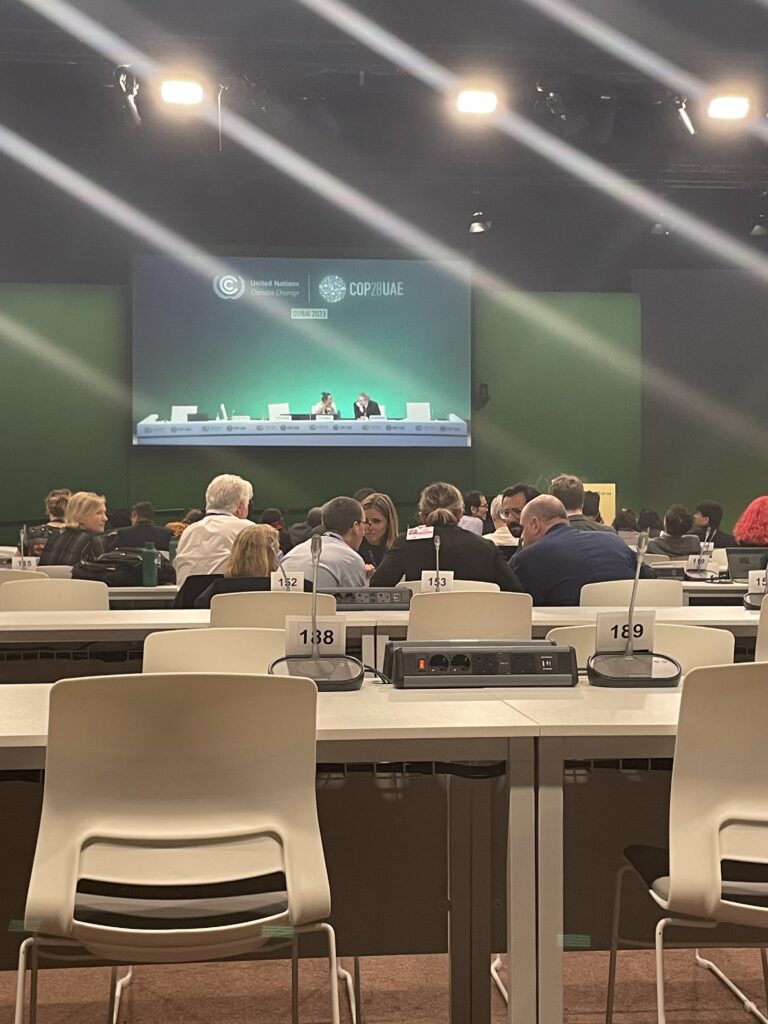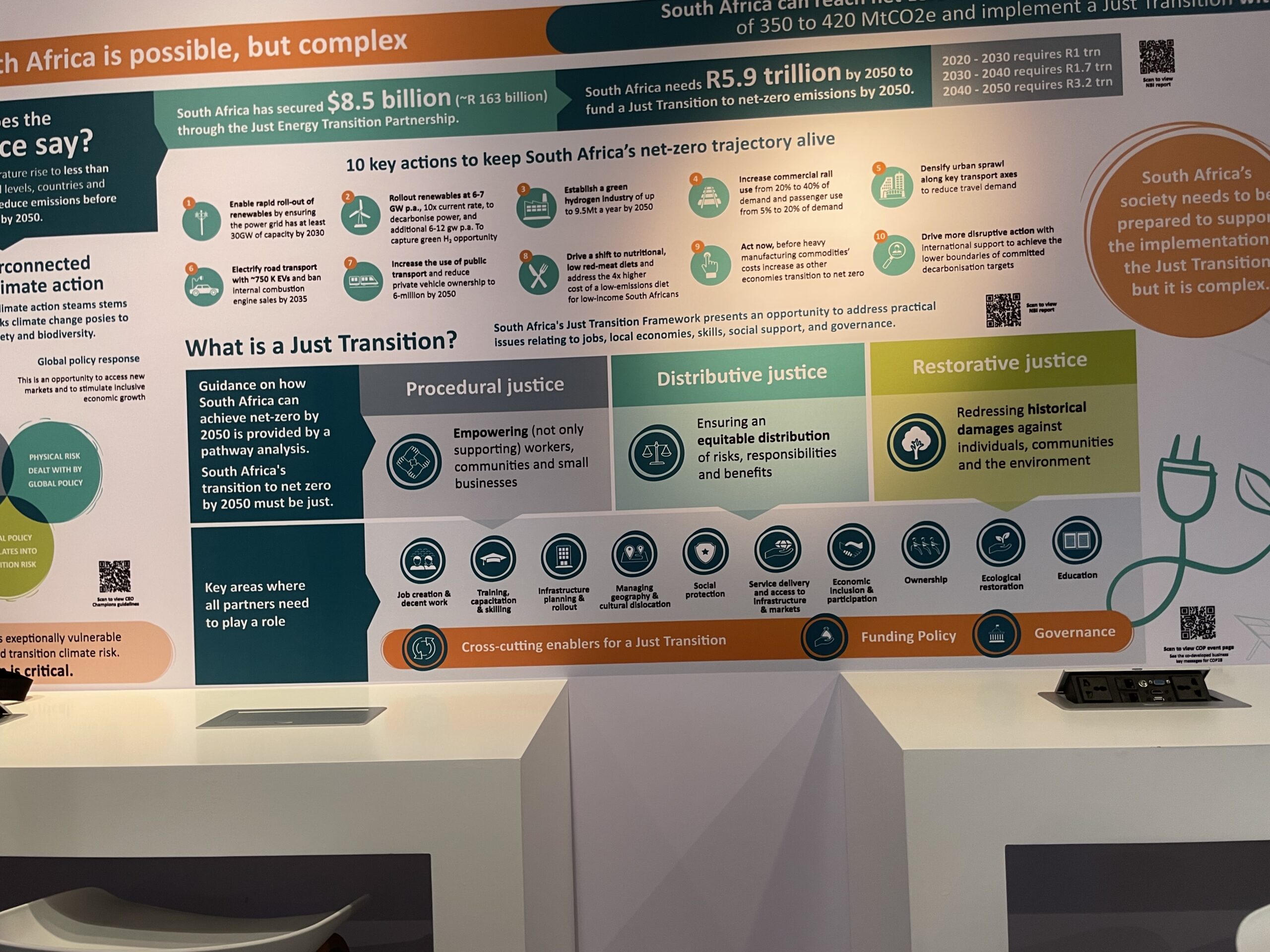by Lucy Kramer (Anthropology, ’26)

On the day before the final Global Stocktake text came out, the parties were lined up to give their interventions—at 1:00 am, when I left for the metro back to my hotel, there were 20 speakers lined up. Country after country, they expressed a consistent disappointment: the unacceptability of the text. Australia went first, speaking for the Umbrella Group: Canada, the United States, Iceland, Israel, Japan, New Zealand, Kazakhstan, Norway, and Ukraine. These countries repeated with fervor: we must phase out fossil fuels. France said that they wouldn’t be able to go home to their kids when “the elephant in the room is fossil fuels.”
But as countries like Bolivia, Brazil, Egypt, Pakistan and beyond mentioned—the real elephant in the room is “common but differentiated responsibility (CBDR),” which recognizes that different countries should play different roles in responding to climate change. This differentiated responsibility acknowledges that hyper-developed countries have a greater ability and responsibility to mitigate climate change and its impacts. Because as Bolivia speaks to the whole room full of ministers: without recognition of this larger, older, and overbearing elephant that is inequity, the world simply moves into “carbon colonialism,” where root causes of wealth are ignored, and money is still an approval stamp to determine to whom, where, and how it flows. In the final press conference with Global Campaign to Demand Climate Justice, they reiterate that this is “not about reducing carbon.” Carbon colonialism includes the continual extraction of minerals from the global South to North for electric vehicles. An energy transition is only a piece in reducing warming, and it certainly will not end global inequality.
Negotiation rooms at COP are where the consensus texts are determined. “Parties,” which refers to the UN member states as well as the groups of aligned nations, each sit at a microphone behind a “flag” with the name of their country. A text is iterated by the Subsidiary Body who works throughout the year, and at COP, to draft the texts with a process of interventions from the parties. The negotiation rooms are areas where parties “intervene” and try to influence what comes into the text, each stemming from different definitions of the problem itself, as seen with the GST interventions. High-emitting countries frame “reponsibility” as the need to “lead” a complete fossil fuel phase out, without full recognition of their historic emissions responsibility, or economic colonial legacy.
Furthermore, in negotiation spaces, I have not witnessed parties speaking about our responsibility to nature, biodiversity, or the climate itself. What I have noticed, though, is low-emitting regions being highly concerned about how they are mitigating climate change, although they have contributed very little to global emissions themselves—Africa, for instance contributing to less than four percent of emissions. Yet, in the various country pavilions that I attended, there is a significant display of efforts to protect biodiversity, have a green energy transition, and take significant measures to be a part of the solution, such as in the South African pavilion, in the photo seen below. 
I had high expectations going into the U.S. pavilion—we are high emitters, and have a lot of work to do to become “sustainable.” And yet the only information they had was the sign in the photo below, and a video showcasing manufacturing and technical achievements. The focus is on how the industry can help other countries use green products. There has not yet been a clear operationalization of CBDR, which could give official standing to historical responsibility. Despite this, low-emitting countries like South Africa present a thorough plan about how their country is willing and needing to change in light of climate change. George H.W. Bush’s 2012 quote at the Rio de Janerio Earth Summit stuck: “The American way of life is not up for negotiations. Period.”

Not only do different countries have different stakes in recognizing responsibility, the structure of negotiations itself also limits the personal ability to speak about responsibility and obligation. The negotiators and ministers of environment speak as the party itself. As a party representative, negotiators are actively alienated from their emotions, thoughts, experiences—the very things which constitute a person. Being a negotiator is a job, with a specific set of outcomes each country looks for. Ohorella paused when I used the phrase ‘playing roles.’ “It’s a game,” he reaffirmed. This specific game, like all others, has set rules, outcomes, and motivations—negotiators have an obligation to their parties political outcome. There is not a lot of room or expression of grief, for the actual situation, the warming globe, the islands being swallowed, and the historical responsibility that should inform outcomes. Those stories are here, held at COP28, by people hope to have them heard. But the stories and their holders are fighting to make it into these rooms in a meaningful way.